Search
Showing 10 of 1702 results for the cuzzy rolly, latest
-
Helping education agents understand the NCEA qualification and the pathways it opens to higher study
Education New Zealand and the New Zealand Qualifications Authority (NZQA) collaborated to organise a webinar for education agents in December on the National Certificates of Educational Achievement (NCEA), New Zealand’s school-leaver qualification.
The webinar was well received, with 241 attendees, and featured a robust question and answer session at the end.
The session helped education agents – and by extension the international students they support – in better understanding how NCEA works, the changes introduced to the qualification in recent years, and how learners can access higher education in New Zealand and internationally after achieving the NCEA qualification.
NZQA Deputy Chief Executive - Assessment, Jann Marshall, said the webinar was a valuable opportunity to build understanding of how the NCEA qualification works.
“It is important for everyone working with international secondary learners to have some understanding of how NCEA works, and the opportunities it creates for learners wanting to continue their study in New Zealand or internationally.
“It was great that we could engage with education agents on the topic and answer questions.”
NCEA is a well-recognised qualification in many countries. New Zealand is also a signatory to UNESCO qualifications recognition conventions (for example, Lisbon, Tokyo and Global Conventions), which support learners with NCEA to work or study internationally.
About NCEA
NCEA is offered at three levels – Level 1 is usually attempted by students in Year 11 of schooling, Level 2 at Year 12, and Level 3 at Year 13 (the final year of New Zealand secondary school). NCEA Level 2 is generally the minimum qualification needed for some jobs and tertiary education programmes, while Level 3, with the University Entrance award, is the minimum standard for entrance into a New Zealand university.
NCEA is standards-based, meaning each learner needs to show they have skills and knowledge at a specified level (a “standard”). Each standard a learner achieves gains them credits, and credits build toward an NCEA qualification.
Learners are also required to meet minimum requirements for literacy and numeracy. There are multiple opportunities in each school year for learners to attempt specific literacy and numeracy assessments, and there is also a list of other standards that can be used towards these requirements.
A recording of the webinar is available to view here on the Resources section of AgentLab
NCEA resources for education agents, students and parents
If you have any questions about NCEA, contact internationalunit@nzqa.govt.nz.
-
Allocation priorities for student visa applications
Immigration New Zealand (INZ) has changed the way they allocate international student visa applications from students in New Zealand, so they have more flexibility and can process these applications more efficiently during the summer processing peak.
INZ’s allocation priorities change from time to time to reflect current demands and will be posted on their website. You can view these allocation priorities here.
Tuition fee receipt reminder
When a student is in New Zealand (onshore) and submits an application for a student visa, it is a requirement to provide a tuition fee receipt with the application at the time of submission.
The approval in principle process is not available for students who are in New Zealand. Any onshore application should include evidence a student:
- has paid their tuition fees in full for one year or one programme (whichever is shorter); or
- that they are exempt from paying tuition fees and their education provider has confirmed this.
If the receipt is not provided with the application, then it has an impact on the processing and the application takes longer to be processed. For more information, you can find INZ's Student visa application information sheet for continuing international students here.
International education data
Every year, INZ publish data on the offshore student visa approval rates and application volumes for education agents by market. They also publish the overseas student visa application decision data broken down by country.
Updated data for 2024 has now been published: View this data here
-
Country insights at your fingertips
Education New Zealand Manapou ki te Ao (ENZ’s) just launched New Zealand International Education – Country Key Information Dashboard provides a rich resource of insights for sector representatives, education agents and consultants looking for key data about international education in New Zealand in relation to a specific country.
Each country snapshot features insights such as international student enrolment data, including broad field and level of study that students are enrolled in, international student visa data, student experience survey findings, as well as overall goods and services exports between that country and New Zealand.
This beta version of the dashboard is drawn from a range of sources, including valuation data from Statistics New Zealand, visa data from Immigration New Zealand, enrolment data from the Ministry of Education, and ENZ’s international student experience data.
ENZ’s Director Insights, Marie Clark, said that the release of the country dashboard is part of ENZ’s concerted effort to provide the sector with a wider range of useable and accessible intelligence to guide their marketing and promotional efforts.
“For providers visiting a potential market or education agents looking to grow student numbers in New Zealand, the dashboard offers an instant snapshot of all the key sources of information for that country and New Zealand.
“This is a beta version, and as we receive the sector’s feedback, we intend to add more information to it over time,” Marie said.
You can view the beta dashboard on ENZ’s Tableau Public site here.
We welcome your feedback on the dashboard at insights@enz.govt.nz.
-
From the CE: Going for growth
Kia ora koutou,
The month of February has seen several important announcements.
Firstly, we received confirmation that the Minister of Education, Hon Erica Stanford, now has responsibility for international education and Education New Zealand.
Minister Stanford is also Minister of Immigration and the Lead Coordination Minister for the Government’s Response to the Royal Commission’s Report into Historical Abuse in State Care and in the Care of Faith-based Institutions. We are looking forward to working closely with our new Minister to advance her priorities for ENZ and international education.
The Government also announced its economic growth plan, Going for Growth: Unlocking New Zealand’s potential. International education is a key plank in the Government’s economic growth agenda and it is one of New Zealand’s major export revenue generating sectors – one that generates jobs, supports the labour market, attracts and retains global talent, and enhances New Zealand’s international relationships. As a sector, international education contributed $3.34 billion in value to the New Zealand economy to the year ending June 2024.
Continuing that theme, economic growth is the focus of the Prime Minister’s visit to Viet Nam this week. Our brand health research has identified Viet Nam as the fastest growing market for awareness of New Zealand as an education destination. International education is a central feature of the mission, which has strong provider representation. I’m looking forward to participating and will be sharing some insights in my next column.
This month we were delighted to welcome Dr Ron Xavier as ENZ’s new Regional Director Greater China and Counsellor Education. Ron joins us from the Ministry of Business, Innovation and Employment where he was the Science and Innovation Counsellor. Ron has worked in China for over six years and has previously been involved in prime ministerial visits and Chinese ministerial visits to New Zealand. I had the pleasure of meeting Ron when I was in China late last year and know he will be a great addition to our team in Beijing.
Whakapau kaha ki te whai i te ao hurihuri
Be strong in pursuing the ever-changing world.
Ngā mihi nui,
Amanda Malu
Chief Executive
Education New Zealand Manapou ki te Ao -
New Zealand universities showcased to global education leaders at QS India Summit 2025
The initiative was well aligned with ENZ’s goal to build global connections for New Zealand education and explore solid opportunities that will help New Zealand thrive through world-class international education.
Education New Zealand Manapou ki te Ao (ENZ), along with the University of Canterbury, University of Waikato and Massey University made an impactful presence across a range of sessions and workshops.
The summit had the New Zealand contingent showcase the quality of our universities and engage in discussions focused on university-industry collaborations, workforce development, global research leadership, while discussing the importance of building resilient, education institutions that can adapt to a rapidly changing world.

Prof. Neil Quigley, Vice-Chancellor of the University of Waikato, exploring India’s leadership in cost-efficient R&D and its role in supporting global partnerships to address pressing challenges at the QS India Summit 2025.
ENZ’s Director of Engagement, East Asia & India, Jugnu Roy, led a discussion on aligning curricula with emerging job market demands to better prepare students for global careers.
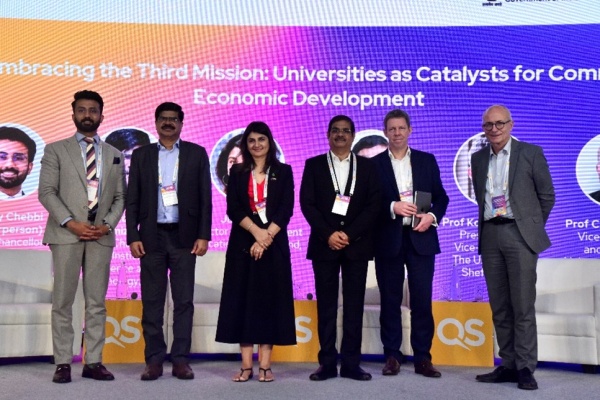
ENZ’s Jugnu Roy discussed how universities could drive social and economic impact beyond their primary roles of teaching and research at the QS India Summit 2025.
Considering how well recognised New Zealand universities are globally, with all eight ranked in the top 2 percent in the 2025 QS World University Rankings, the QS Summit was an opportunity for New Zealand education to strengthen its relationships with key global and Indian education leaders, Jugnu said.
“New Zealand universities are also known for their sustainability stewardship, with our universities ranking first for sustainability stewardship and second for sustainability outreach in the Times Higher Education Impact Rankings 2024.
“Within this context, the summit was a strong platform for us to share best practices and explore new avenues for collaboration between New Zealand and India.
“We look forward to collaborating with global and Indian leaders in education to shape a brighter future together.”
-
From the CE: International education in the spotlight
Kia ora koutou,
I’ve recently returned to New Zealand following a productive visit to Viet Nam with the Prime Minister’s Trade Mission. It was highly encouraging to see international education front and centre of so many conversations. Beyond attracting Vietnamese students to New Zealand, the education relationship between our countries is evolving into deeper collaborations involving education institutions, businesses, and governments.
The visit also showcased outstanding examples of educational partnerships across the spectrum of New Zealand’s international education sector, from universities and private training establishments to EdTech companies, highlighting the breadth of collaboration opportunities.
Overall, the Mission was a valuable opportunity to raise awareness of New Zealand as a top-tier education destination offering a safe and welcoming environment.
International education was also a component of Deputy Prime Minister and Minister of Foreign Affairs, Rt Hon Winston Peters’ official visit to China. As part of his programme, the Minister had a warm meeting with Chinese alumni of New Zealand universities. From the report back, it was clear that the New Zealand study experience had left the alumni with a lasting, positive impression.
Coming up in May, ENZ will be going into the field for the 2025 International Student Experience Survey. This survey covers a range of topics relevant to the sector, including student decision-making, arrival and orientation, the education experience, living experience, people and connections, and perceptions of value for money.
Last year’s survey had 86 percent of international students reporting a positive overall experience of their time in New Zealand, and 41 percent of students giving an ‘excellent’ rating, the highest percentage yet! In case you missed deep diving into specific aspects of the student experience, you can browse through them here.
I’ve started packing my bags again, as this weekend I will be joining the Prime Minister’s Trade Mission to India. I’ll be staying on for a further week in Delhi for APAIE 2025. I look forward to updating you in my next column.
Ngā mihi nui,
Amanda Malu
Chief Executive
Education New Zealand Manapou ki te Ao
-
Around the world in five
Global
Decline in interest in ‘Big Four’ study destinations
Interest by prospective international students in the ‘Big Four’ study destinations – the United States, Britain, Canada and Australia – declined by 14% in the year ending January 2025.
Australia
The 2025 student: A data-driven analysis of Gen Z and learning abroad
The landscape of higher education has undergone profound shifts over the past five years. The characteristics, expectations, and financial realities of students in 2018 differ significantly from those of today’s university cohort.
United Kingdom
Report projects need for greater diversification in international student recruitment this year
A new analysis from British Council projects softening student numbers from China and India this year. The report argues that educators will need to extend recruiting efforts across a larger number of markets.
China
Chinese universities “hungry” for international partnerships
Chinese universities are keener than ever to create and upgrade international partnerships, a new white paper has said.
India
Could Indian branch campuses bail out struggling Western universities?
India’s opening up to overseas outposts has injected new life into a form of transnational education.
-
Thailand retention campaign launches to encourage long-term study in New Zealand
ENZ Thailand has launched a retention campaign to encourage students from Thailand who have previously studied here to return to New Zealand for further study.
Students who choose to continue their education in New Zealand will be eligible for an air fare scholarship (valued up to NZD $3,000), making it easier for them to travel and transition into long-term study. At least 25 New Zealand education providers have volunteered to subsidise the award.
The campaign has already generated strong interest. It was launched at the New Zealand Summer Pre-Departure Orientation on 1 March in Bangkok with over 240 students and parents in attendance.
The scheme will work with students or education agents providing proof of previous study. Once the students are in New Zealand, they can rebate the air fare through coordination with their agents.
Education providers involved in the campaign:
Universities:
- Lincoln University
- University of Canterbury
- University of Otago
Schools:
- Auckland Grammar School
- Cambridge High School
- Glendowie College
- Hamilton Girls’ High School
- Hillmorton High School
- Kaikorai Valley College
- Lynfield College
- Macleans College
- Massey High School
- Mount Albert Grammar School
- Napier Boys’ High School
- Newlands College
- Nga Tawa Diocesan School
- Northcote College
- Palmerston North Boys’ High School
- Palmerston North Girls’ High School
- Papatoetoe High School
- Pukekohe High School
- Rosehill College
- Waitaki Girls’ High School
- Whanganui Girls’ College
- Whanganui High School
If you are an education provider interested in being involved in future retention campaigns, you can email Jaruwan Pongjaruwat, Programme Manager – Thailand at Jaruwan.pongjaruwat@enz.govt.nz.
-
PM’s mission to Viet Nam marks significant progress in international education
Prime Minister Christopher Luxon’s recent trade mission to Viet Nam saw significant education outcomes delivered, including boosting the number of available Manaaki New Zealand Scholarship awards, increasing the number of the New Zealand Schools Scholarships (NZSS) to 45 places and introducing 14 New Zealand Universities Awards (NZUA) for the first time, as well as the announcements of several new partnerships between Vietnam and New Zealand education providers.
Education New Zealand Chief Executive, Amanda Malu, joined five providers for the education component of the trade mission - The University of Auckland, Auckland University of Technology, Media Design School, Pacific International Hotel Management School, and Neurofrog (edtech company).
The New Zealand-Vietnam EduConnect at Foreign Trade University was a significant education event in Hanoi, where Amanda joined Prime Minister Luxon in witnessing the signing of cooperation arrangements between education institutions in New Zealand and Viet Nam.
The EduConnect event also recognised the contribution of alumni to the friendship between our countries, with the launch of the inaugural New Zealand Alumni Network in Viet Nam.
ENZ Regional Director, Ben Burrowes said it was a wonderful opportunity to underscore the importance of people-to-people links in strengthening bilateral relations.
“This comes at an auspicious time, as New Zealand and Viet Nam celebrate the 50th anniversary of our longstanding partnership,” he added.
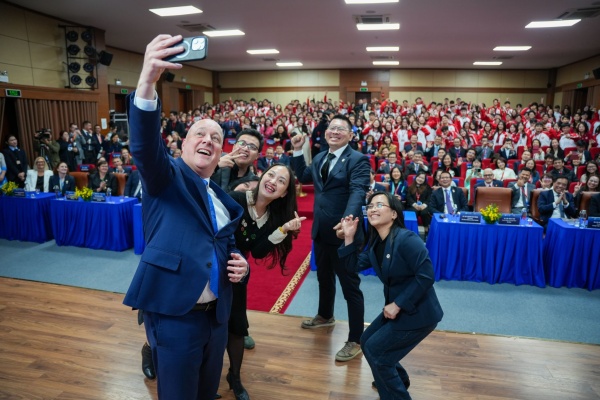
Prime Minister Christopher Luxon snaps some pictures with alumni at the New Zealand – Viet Nam EduConnect event.
AUT Vice-Chancellor Prof. Damon Salesa, Chair of Universities New Zealand's International Committee, represented Universities New Zealand to sign the Collaboration Arrangement with the Department of International Cooperation of the Vietnam Ministry of Education and Training.
The arrangement provides additional support to Project 89 scholars who wish to study in New Zealand. Project 89 is one of Viet Nam’s key initiatives to support its education sector, allowing local lecturers to pursue PhD study and postgraduate study overseas on fully-funded scholarships.
Following the success of education engagements during this trade mission, Amanda Malu, said New Zealand sees significant potential in strengthening education partnerships with Viet Nam.
“New Zealand will continue to expand the range of initiatives in Viet Nam across all levels of education, from schools to postgraduate study, to make it easier for Vietnamese students to engage in knowledge exchange, innovate and realise their dreams of studying abroad,”
“With Vietnam’s ambitious education and technology goals for 2045, our nation is well-positioned to support this journey,” she added. -
Hundreds of Brazilian high school students arrive at New Zealand schools
Over January and February, 200 students from Paraná and 100 from São Paulo arrived in New Zealand on a Brazilian state-funded scholarship that will have them spending a semester and term in New Zealand schools while staying with host families.
Chosen for their academic performance, attendance, and completion of an English course, these top students get a chance to immerse themselves in New Zealand's education system and culture.
New Zealand is considered a strategic partner by Paraná state and São Paulo. This programme highlights the success of increased educational cooperation between Brazil and New Zealand. In addition to improving English proficiency, the initiative also aims to develop intercultural skills.
Paraná's programme, launched in 2019, has sent 1,240 students to various countries, with more than 600 going to New Zealand.
Coordinator of the São Paulo programme, Simone Telles, said New Zealand was chosen for this programme due to our innovative education system, use of technology, the freedom given to students and the welcoming nature of New Zealanders.
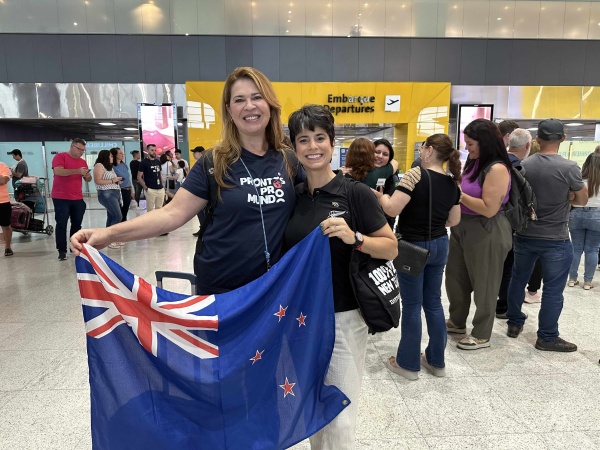
Simone Telles and ENZ’s Market Development Manager, Bruna de Natale: Education partnership between São Paulo and New Zealand.
In São Paulo, ENZ Market Development Manager, Bruna de Natale, attended one of the departure days for the group traveling to New Zealand. Bruna spoke to Luciangela Fonseca, mother of one of the selected students, Juan Fonseca. Luciangela said she felt “pride mixed with fear and emotion” and that the family felt privileged to get this opportunity.
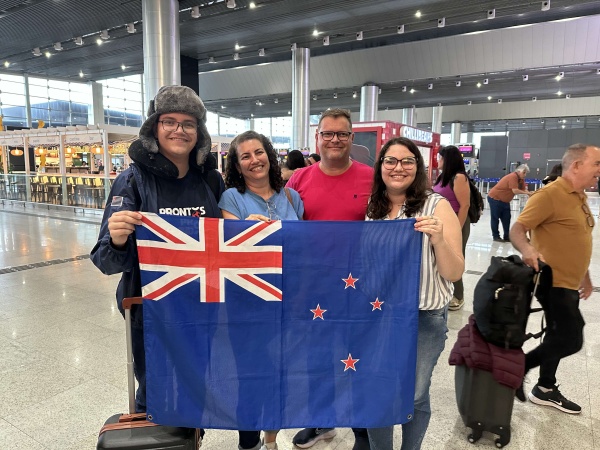
Juan Fonseca, his parents, and sister. Emotions at the departure for Auckland.
All programme costs are funded by Brazilian states, including transportation, education, food, accommodation, and leisure activities.
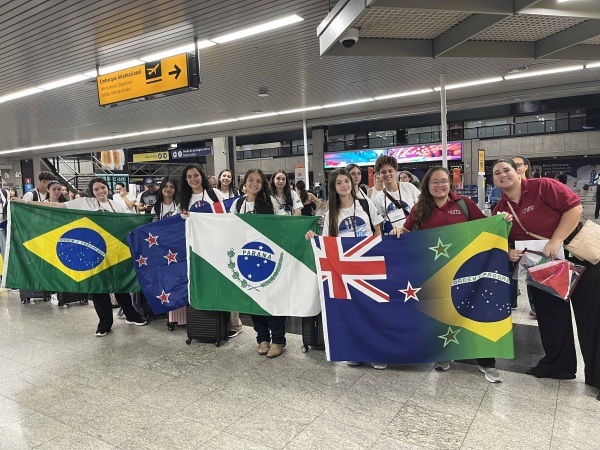
Paraná students departing in São Paulo.

